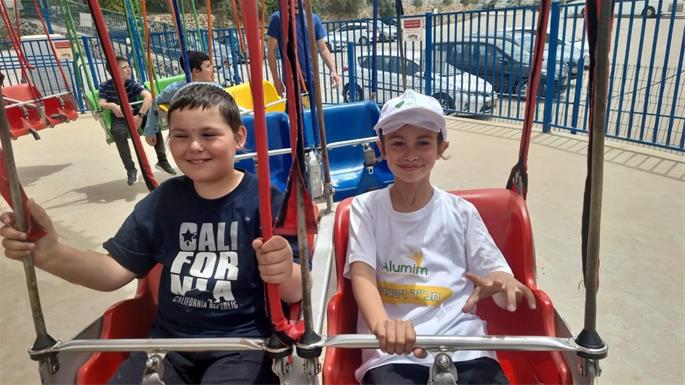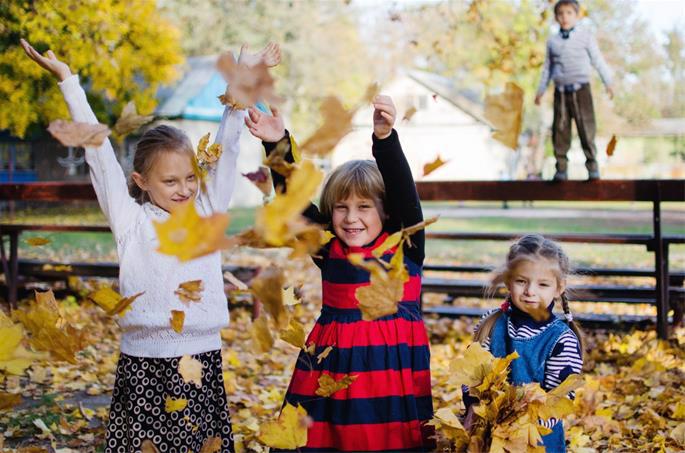
The Daunting Job of Yet Again Uprooting Our ‘Family of 60’
by Zalman Bukiet, as told to Menachem Posner – chabad.org
Uprooting a family in the face of war is difficult. To do so when your “family” includes 60-odd children is daunting. And to do so twice in two years is unimaginable.
Yet that is exactly what my wife, Malkie, and I are doing.
Since 2003, we have run the Alumim Children’s Home out of a beautiful campus outside of Zhytomyr in Western Ukraine. Nearly two years ago, our children were rushed from Ukraine to Ashkelon in Southern Israel. Now, they’ve been uprooted yet again to Kfar Chabad in the center of the country, where the bombings from Gaza are less intense and there is more time to get to a shelter when the sirens do go off.
Even as they are safer from bombs, the trauma of living through their second war continues to haunt them.
Our children come mostly from impoverished villages and towns in the Ukrainian countryside—the historic Pale of Jewish Settlement—either orphaned or born to parents who recognized that they were not positioned to give them a solid education, stability and a healthy base upon which to grow into productive and functioning adults.
When the war broke out in Ukraine just before Purim of 2022, the shelling and bombing began at 6 a.m.
Since our campus was just a kilometer away from a Ukrainian air base, our kids were jarred awake by booms and shaking, terrified. We feared for their lives and knew we needed to get them out fast.

Knowing that an attack was imminent, we had made arrangements just in case and were able to be on the buses before the roads filled with traffic and the gas stations ran out of fuel.
We spent a quiet Shabbat at a hotel near the Romanian border, where the beds had been reserved in advance by Rabbi Shlomo Wilhelm, director of Chabad in Western Ukraine.
When we realized that the war would last more than a few days, we were able to cross the border into Romania and then fly with the children to Israel.
When one considers that almost none of the kids had passports, the miracles become apparent. My wife had a suitcase full of birth certificates and other documents, and that worked! We were soon joined by some of the children’s mothers and other community members. Our group kept growing until we reached 170 souls. El Al Airlines wanted us to finalize the number of seats we needed, and the paperwork was an open question, but we hoped and prayed and tried to take as many people as possible with us out of the war zone.
One of our children had been away visiting his home village. We paid a driver 10 times the normal rate to pick him up and get him to us so we could go to Israel together.
Once in Israel, we were graciously hosted in Nes Harim, a campsite belonging to the Jewish National Fund. It is a large place with dining halls, cottages and sprawling grounds. They took care of the food, the logistics and everything else, leaving us to care for our kids, their mothers and the others in our caravan of Ukrainian Jews now in Israel.
We came for a month and stayed for six. But by the time the new school year rolled around, we knew we needed to make more permanent arrangements. War or no war, the kids needed to go to school, the mothers needed to work, and everyone needed stability.
So we began looking for a community that would be a good fit for us and were delighted to discover Ashkelon.
Chabad in Ashkelon, led by Rabbi Mendel Lieberman, operates an educational system from pre-k to 12th grade, and the community is welcoming and salt-of-the-earth. With many native Russian speakers living there, we knew our people would feel at home.
And we did.
We rented large villas for our kids (one home for boys and another for the girls), apartments for our 16 Zhytomyr families, and a home for Malkie, me and our biological children.
Throughout, we were accompanied by our fellow Chabad emissaries, who have made Alumim their life purpose: Rabbi Nachshon and Chani Rubin, and Rabbi Mendel and Ahuvi Lichtstein.
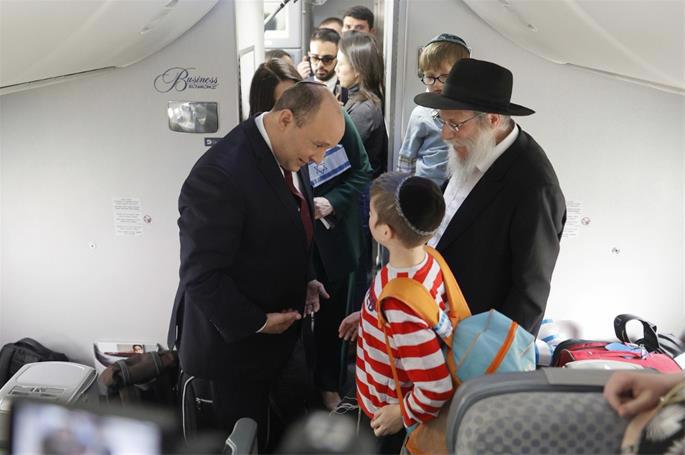
Ashkelon Became Home
And so Ashkelon became home. The kids learned Hebrew, gained Israeli friends and integrated into the local community. The mothers took jobs and learned to navigate life in Israel. And we all got used to the new normal.
Of course, the kids were homesick for Ukraine, having been whisked out so fast and not having a chance to say goodbye.
When one of us would go back for a visit, they’d ask us to bring back a favorite item, a toy or another memento, and we’d try to accommodate.
During this past year, we arranged for every kid to have a visitor from Ukraine—a mother, a grandparent, or an uncle or aunt. We planned fun outings and activities for the duration of the visit and made sure they’d pack in as many good memories as possible. This was so important for them and was worth all the logistical challenges it involved.
This past summer, we decided to stay another year in Ashkelon, which we’d all learned to call home.
Every holiday, our community gathered to celebrate together, and Simchat Torah was no exception. The dancing and singing was so joyous, and we felt so good. We’d finally settled. And the kids were adjusting beautifully.
Then, again at 6 a.m., the sirens blared.
It was happening again.
Again on the Move
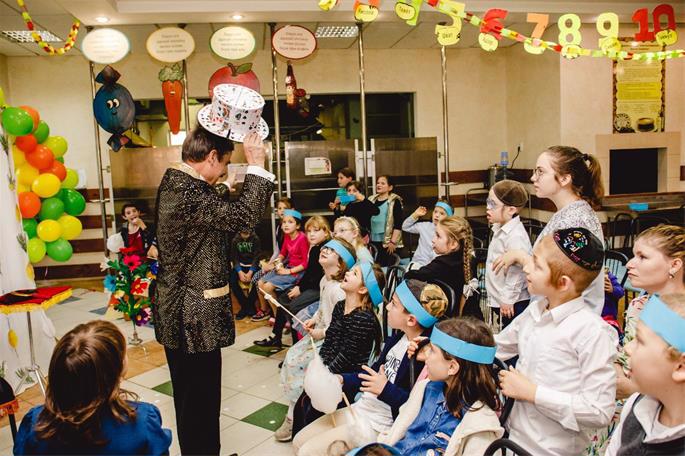
We were home with our biological children, and the kids were in their homes, in their two villas.
We had 30 seconds to get to a shelter. Thank G‑d, we all had shelters to go to.
But the shelters were small, far from our homes, and the booms we heard all around us were terrifying.
My wife and I were itching to go to the villas to make sure that all the kids were OK, but the sirens were non-stop, and we could not even take three minutes to walk there.
Our kids were sitting with us in the cramped shelter, counting sirens. By the time they got to 70, they stopped.
Around 10 a.m., we heard a giant explosion, followed by more explosions. We realized that our street had been hit. Cars were on fire. Every time another tire or engine exploded, we heard another giant boom!
By noon, my wife and I decided to run to the two children’s homes. We needed to make sure they were OK.
Thank G‑d, they were alive. They were shaken, scared and traumatized. But they had food and were all staying put in the shelter.
By afternoon, the constant sirens stopped and we were able to gather our group in a larger shelter that doubled as a Chabad House (this is quite common in Israel), where we prayed together.
By then, we had heard the news. We knew things were bad and were thankful to be alive. As hard as it was, we sang and danced and celebrated Simchat Torah for ourselves and for all those we knew would not be able to dance that day.
That night, we made plans to relocate to Kfar Chabad, the Chassidic village in the heart of Israel, where we’ve been ever since.
It took a day to get the paperwork in order, but from the moment we had the green light, it was all of 13 minutes to get out.
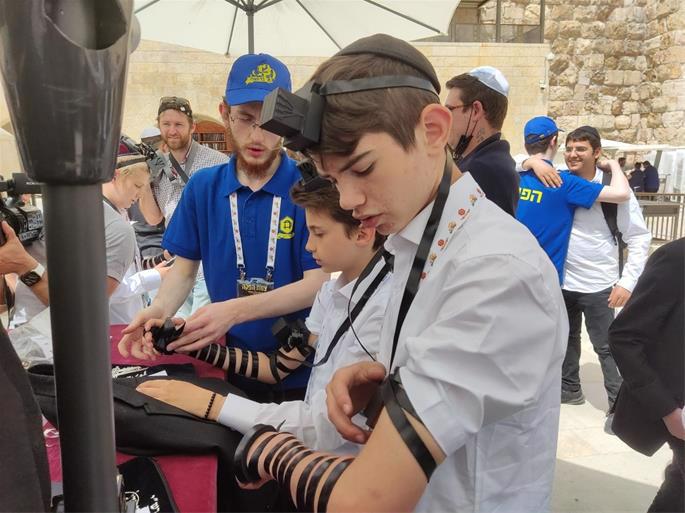
We are being hosted in two facilities. The boys are in Ohr Simcha, a local educational institution. And the girls are at Midrashia, which normally hosts people for weekend visits to Kfar Chabad, to soak up the Chassidic atmosphere and experience village life from within.
Malkie and I and our nuclear family are at Malkie’s parents’ home.
Our days are full as ever. Right now, Malkie is away assisting one of our alumni, who recently married and just had a baby. We are now “grandparents” many times over, and we savor the sweetness of seeing how the kids have grown and started families of their own.
The sirens are less frequent here (just once every few days on average), and we have 90 seconds to reach shelter, which can make all the difference when taking care of children, some of whom are still infants.
There is no school here that can adequately serve our kids, so we are tailoring a program just for them, with local teachers, tutors and others providing structure and opportunities for growth. The most important thing is that they have that structure and stability, and we are doing our utmost to provide it.
We are also making sure they maintain their social ties. Last week, Rabbi and Mrs. Wilhelm celebrated their daughter’s marriage, and the kids were all there at their own giant table. They are part of the Zhytomyr community, no matter where.
People ask us about the future, one month from now, one year from now, etc. If the past two years have taught us anything, it’s that we really cannot know what tomorrow will bring.
But we have faith in G‑d, we were entrusted with a mission by the Rebbe, and we love the kids deeply.
And we are confident that we will keep going, helping each child blossom wherever they are planted.

